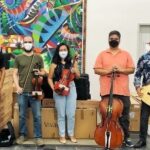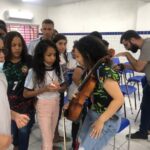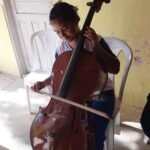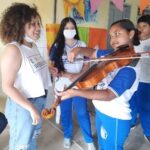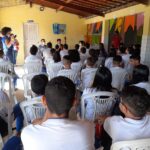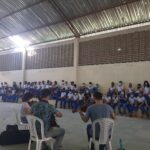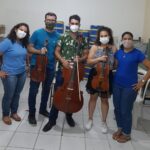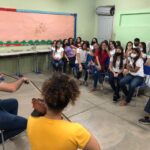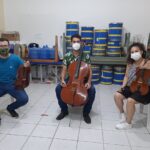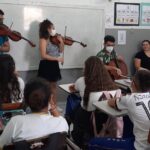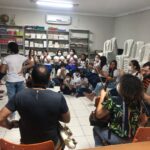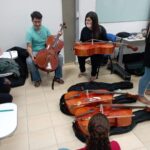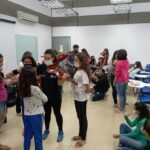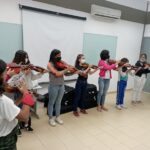Orchestrating dreams, cultivating talents
Objective
The Brazilian Shift Institute, a non-profit association, aims to bring together people, institutions and companies that want to contribute to the transformation in the lives of underprivileged children in Brazil, starting with the Northeast region, through the universal language of classical music.
Inspired by the “Brazilian Shift” cello technique created by Maestro Aldo Parisot, the Brazilian Shift Institute adopts this emblematic name to reflect its mission of transforming the future of Brazil. This innovative technique symbolizes our dedication to promoting significant changes in society through the musical education of underprivileged children.
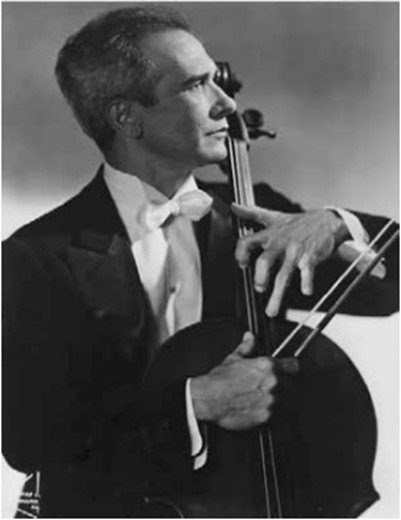
Aldo Parisot was born in the state of Rio Grande do Norte. When he was young, Tomazzo Babini – an Italian immigrant and cellist residing in Natal – taught him music and the cello. Later, Professor Parisot moved to the United States and became the longest-serving faculty member in the history of Yale University. He also served on the faculty of the Juilliard School. As a cello teacher, Aldo Parisot taught and inspired generations of cellists worldwide.
The musician passed away at the age of 100 on December 29, 2018. A “celebration of his extraordinary life and career” was organized by the Yale School of Music on April 17, 2019.
ALDO PARISOT PROJECT
The Brazilian Shift Institute is proud to support the Aldo Parisot Project, an initiative by the School of Music of the Federal University of Rio Grande do Norte (EMUFRN) and partners, which has been transforming the lives of young people in Rio Grande do Norte for three years.
Honoring Aldo Parisot’s legacy and contributions to music and education, the project demonstrates our commitment to nurturing talents and promoting positive changes through musical education.
Aimed at children and adolescents in vulnerable social situations, the initiative offers cello, violin, and viola lessons, transforming the social reality of the participants and providing access to culture.
The Aldo Parisot Project aims to bring classical music education to the countryside of Rio Grande do Norte, with an initial focus on the Seridó region. The musical skills developed are based on string instruments: violin, viola, and cello.
The initiative connects female leadership profiles in the state’s rural areas, seeking to promote women’s leadership in classical music and the implementation of cultural activities in these regions. “The target audience for the first meetings are girls from the countryside aged between 10 and 15, as the project aims to emphasize not only music but also the United Nations Sustainable Development Goals, especially SDG 5,” says Fabio Presgrave, the project coordinator and Deputy Director of the School of Music at the Federal University of Rio Grande do Norte (EMUFRN).
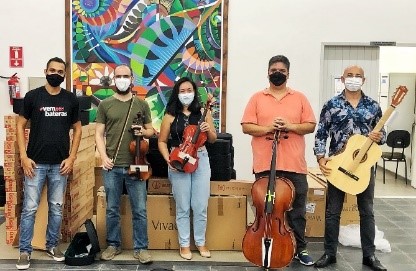
The first acquisition of 52 instruments was sponsored by the Madruga BTW office in Brasília, which enabled the project to commence. The instruments were delivered in June 2022, after which musicians and teachers organized a tour in rural areas of Rio Grande do Norte to introduce them to public school students. According to estimates from the Caicó Department of Education, over a thousand children had the opportunity to interact with the string instruments during this tour. The project was officially launched on September 30, 2022, celebrating Aldo Parisot’s 104th birthday.
Over the past two years, the project has benefited approximately one hundred girls from the municipalities of Caicó and Jucurutu. All students were enrolled in the public school system, marking the first systematic teaching of string instruments in the Seridó region’s history. Currently, the project has a string orchestra that has been performing, inspiring the community, and encouraging other girls to study music. The opening of a new branch in Currais Novos is planned for this year.
See the testimony of Maíra Izabely, a student of the Aldo Parisot project.
